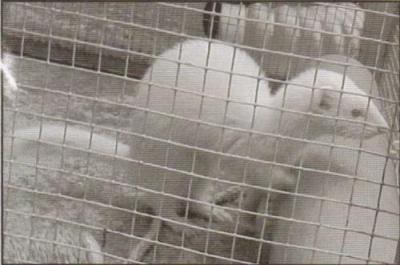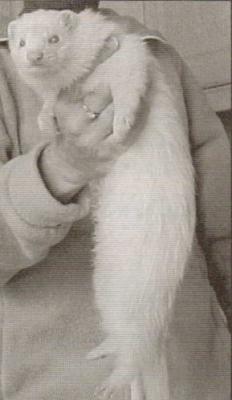Back to Basics - Care and Wellbeing
by Julie Stoodley
This series is for people who fall in love with our ferrets at shows, rescue centre open days and public relations events but who are, very wisely, doing research before introducing their own into the family. JULIE STOODLEY, who runs Sleaford Ferret Rescue, is in the frontline of ferret care, taking in sick, starving and pregnant animals in need of nursing, love and general common sense care and attention. She has rehomed more than 70 ferrets so far this year. Here, Julie shares her knowledge and experience about what makes a healthy and happy ferret. Basics really does mean basics, so knowledgeable readers - look away now!

Left
Before: This albino hob is undersized, painfully thin and has overgrown front claws.

Right
After: Just a few weeks after Julie took him in, he is plump and healthy. He has now found a loving new home.
EARS
Ears should be free from wax and ear mites. Simple ear cleaning drops should keep these problems at bay, although black discharge can indicate the presence of mites and veterinary attention should be sought. Regualar ear cleaning thoughout the summer months is essential. Never poke anything into your ferret's ears as you can perforate the eardrum.
TEETH
Clean white teeth and soft pink gums are a sign of a healthy ferret. Older ferrets probably have tartar but a regular good diet and treats such as Whiskas Dentabits should help with this
COAT
A shiny, healthy, coat makes for a comfortable ferret. Regular handling and brushing detaches loose hairs and bathing can help, especially with rescue ferrets that have been straying and are infested with parasites. Do not over bath as this takes away the natural oils in the coat. Brushing and combing frees loose hairs and deters unwanted visitors. It is advisable to treat your ferret with a flea and tick solution at the start of the summer.
EYES
Eyes should be bright and clear with no weeping or discharge.
FEEDING
There are now many specially prepared foods on the market. A dry complete diet contains everything a ferret needs. You can give treats but not too much sweet stuff. Ferrets easily become overweight. Freshly cooked chicken or raw mince is a tasty treat as well as being good nourishing food, especially for a poorly ferret whose appetite may need tempting. Raw egg is an excellent occasional variant to the diet, as well as being beneficial to your ferret's coat.
HOUSING
Ferrets are good housekeepers. Daily cleaning and regular changing of bedding helps them keep their homes comfortable and hygienic.
Eyerything else is common sense. You will know your ferret and if his or her behaviour alters suddenly in any way, or you can feel any unusual lumps or bumps, seek medical advice immediately. Just remember that with TLC, positive handling and detailed attention to lifestyle, you will have a happy ferret.
A healthy pet is a happy pet
